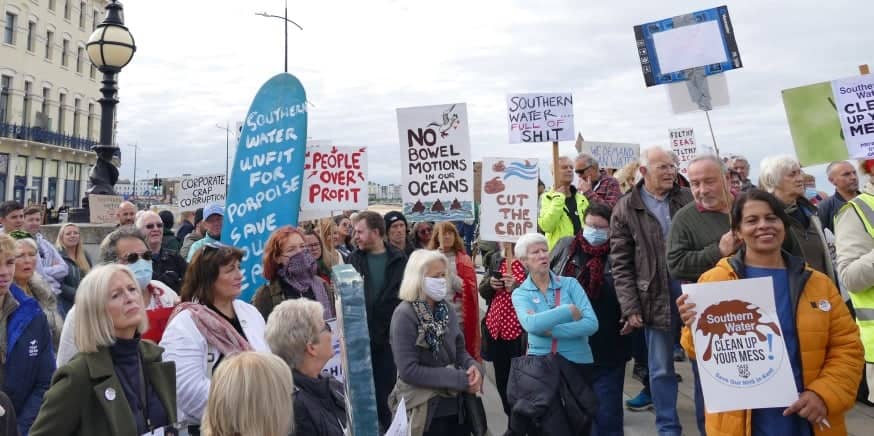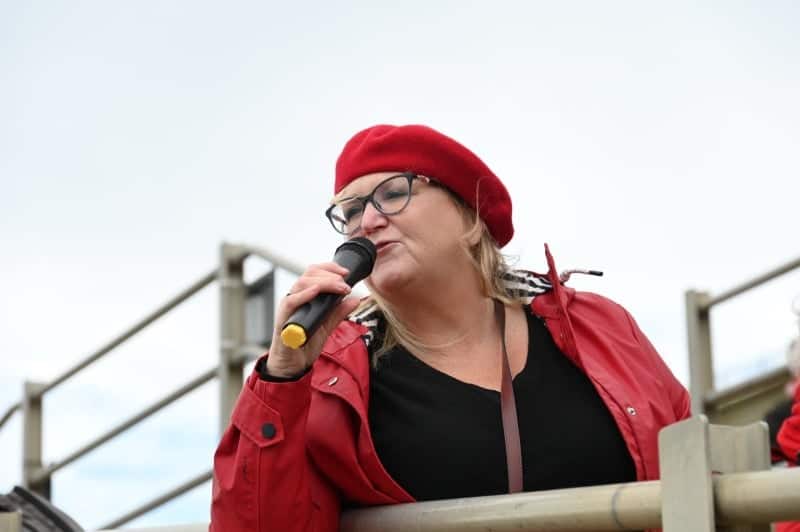
Southern Water is launching a task force this week and says it aims to cut storm overflows by 80 per cent by 2030.
The announcement comes on the heels of multiple demonstrations around the country protesting at Southern Water sewer outfalls and pumping station discharges into our coast and rivers.
The protests in Thanet followed combined sewer releases and failures at Southern Water pumping stations. The most recent were in October and in June which resulted in the majority of Thanet bays displaying warning signs to stay out of the water.
There have also been numerous combined sewer outflows affecting water quality.

Southern Water says: “Customers have made it clear the use of storm releases is no longer acceptable. And the company’s open and transparent storm release data – available in near real-time on its industry-leading Beachbuoy service – has had an important role in making people more aware of when and where these releases happen.”
Storm overflows are regulated releases of wastewater during rainfall to protect people’s homes and businesses and other properties from flooding. They are an integral part of the Victorian-era sewage system. Storm overflows typically occur during periods of heavy rainfall and are more than 95 per cent rainwater.
Combined systems convey both sewage from homes and businesses as well as rain and storm water collected from roofs and hard paved areas. During heavy rainfall, the capacity of combined sewers can be exceeded and lead to localised flooding as a result of the water backing up the system to the closest available escape route: manhole, toilet, sink, basement etc.
In some combined sewer systems where flooding of properties could occur in heavy rainfall, there are built in overspill weirs, called storm overflows, which release excess water into rivers to prevent flooding. Storm overflows (also known as Combined Sewer Overflows) are permitted by the Environment Agency to operate in certain conditions. The majority of storm overflows have equipment installed to record the number of times that water passes through them.
The task force will work in tandem with Southern Water’s £1.5 billion investment programme, which aims to reduce by 80 per cent all pollution incidents by 2025.
The task force will focus on nature-based solutions – such as ponds and wetlands, soakaways and rain gardens – alongside an increase in storage.
The most efficient, cost effective and environmentally friendly way to cut the use of storm overflows is to separate rain water from the sewer system.
Southern Water says work in the summer showed that by reducing the amount of rainwater run-off from roads and roofs entering the pipeline system by around 40 per would mean an 80 per cent reduction in storm overflows.
Ian McAulay, Southern Water’s CEO, said: “There is a growing call to take action to reduce the frequency and impact of storm overflows. That is a task of scale and complexity and needs multi-sector collaboration and a join up of policy to make it happen, which of course appears difficult today.
“However, just 20 years ago, the quality of our coastal waters needed to improve drastically. Today, reflecting significant investment driven by focused policy, all 83 of our regional bathing waters meet strict European Standards and a total of 78 are rated excellent or good.
“Delivering a similar transformation in the reduction of storm releases is the logical next step and we believe this can be achieved. We will play our part in leading and driving the collaboration and investment needed.”

County Councillor Karen Constantine, who is among the organisers of the SOS Ramsgate campaign, said: “It’s very good news to hear that Southern Water and the chief executive Ian McAulay are finally listening and responding to the concerns of people in Thanet.
“However, we have been calling on them to agree to a public meeting in Ramsgate since early October, and so far, Southern Water is unable to provide us with any dates. This isn’t good enough. It’s all very well promoting the initiatives that they are now taking in the teeth of public opinion, but we really need to enter into a proper dialogue, and the only way to do that is that a public meeting.
“I’ve also asked to have a direct meeting with the Chief Executive at his earliest convenience. It would appear that this request is also falling on deaf ears. Further, we have also requested for water testing to be undertaken by independent body so that we can be as certain absolutely certain that our water isn’t contaminated and is safe to swim in and to drink.
“If Southern Water is genuine in its attempts to win back public confidence it will agree to a public meeting, meet with a delegation from Thanet and other areas to hear our concerns, and ensure that our water is tested by an independent body. Nothing less will satisfy us.”
A proposal from the Lords to the Environment Bill that would have placed legal duties on the companies to reduce discharges was defeated by 265 MPs’ votes to 202 this month. South Thanet MP voted against government and was in favour of the Lords’ amendment. North Thanet MP Sir Roger Gale could not vote as he chaired the Bill through the committee stages but has voiced his view that “Southern Water (should) take responsibility for their actions.”
However, the government then U-turned, announcing that the Environment Bill “will be further strengthened with an amendment that will see a duty enshrined in law to ensure water companies secure a progressive reduction in the adverse impacts of discharges from storm overflows.”
Southern Water says it welcomes the Government’s announcement that it will amend the Environment Bill, currently going through Parliament.

